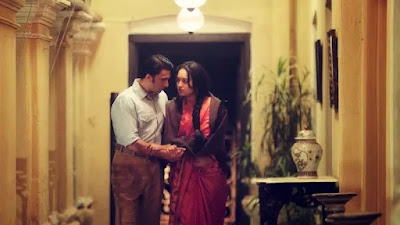Lootera is the latest collaboration between director Vikramaditya Motwane (who wrote 2009's modish myth-update Dev.D) and writer Anurag Kashyap (who directed the recent underworld epic Gangs of Wasseypur), the pair presently being credited with nudging Hindi cinema towards a new maturity. (Given the global success of last month's utterly sophomoric Yeh Jawaani Hai Deewani, you feel they may just have their work cut out for them.) Considering their ultra-hip credentials, it may come as something of an eyebrow-raiser to see Mills & Boon listed as a (gulp) "brand partner" in Lootera's opening credits, but what follows satisfies as both the definition of a swooning period romance and a tale of forbidden love that could easily translate to a Wasseypur-style gangster milieu.
In 1953, the household of a rich landlord is thrown into physical and emotional disarray by the arrival of Varun (Ranveer Singh), a handsome yet diffident archaeologist keen to dig for relics on his host's sizeable estate. In the course of his business, Varun locks eyes with Pakhi (Sonakshi Sinha), the landlord's beautiful yet ailing daughter, winning her heart in declaring his desire to someday paint a masterpiece in the Himalayas. He is, however, acutely aware that he doesn't have the fight in him to snatch the girl away from her over-protective father, and so resolves to keep digging; in doing so, he happens upon some other way of undermining this suddenly fragile household.
An end credit reveals the story was inspired by O. Henry's short story "The Last Leaf" (set amid the boho Greenwich Village set), but Motwane and Kashyap are clearly also indebted to Shakespeare (the lost empire) and even Chekhov (there are prelapsarian trips to an orchard). Cinematically, Lootera backs away from almost every Bollywood cliche you can think of. Motwane has sought out authentic-looking locations rather than sets, and allows the action to be quiet and restrained where others might have aimed for loud, frenetic and showy. Several times, the soundtrack is hushed to the extent you can hear the characters breathing, a tactic designed in part to point up Pakhi's growing respiratory distress.
The actors, relieved of the burden of playing to the cheap seats, come into their own; these are unmistakably performances, and not mere panto turns. Singh, indeed, initially appears so reticent and shrugging a presence one starts to question his thespian credentials - until it transpires Varun's diffidence is crucial to the plot. And Sinha, who caught the eye as the female lead of last November's Son of Sardaar, only benefits from having an entire film constructed around her. Lootera needs you to fall in love with her from scene one (you do), and for the intensity of that feeling to grow with every passing frame (it does), so you feel precisely that hurt and betrayal that is to come (you do).
All of which is to let slip that, yes, there are narrative surprises here, too: there's something truly inspired in how the film comes to undermine its own foundations, turning what we think is one story into quite another, via one of the dooziest pre-intermission cliffhangers you will ever encounter. The second half - which opens with Pakhi, like the writers, scratching away at a pad, venturing new directions for her story - reveals just how fine the line is between romance and noir, realism and poetic realism, and how, by reducing the melodrama to a low simmer, a commercial Bollywood release might channel not just the emotion of, say, Le Jour Se Leve, but also its artistry and infallible story logic, and in such a way as for that not to sound like a preposterous proposition.
That this is still a transitional film is apparent from some patchy, grainy-looking night scenes, where the digital photography temporarily leaves a carefully composed and lushly lit production looking Dogme-rough, and from the need the producers feel to flash up an onscreen health warning every time one of the characters reaches for a cigarette. Yet, in the main, Motwane and Kashyap have between them found wholly rewarding solutions to the question of how the Hindi cinema might grow up without sacrificing the distinct strengths and core values of Bollywood. Varun will eventually paint his lasting masterpiece, but it's an affecting miniature, in a form that is absolutely not what you may have been expecting. The film's a lot like that, too.
Lootera is in cinemas nationwide.

No comments:
Post a Comment